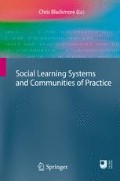Abstract
In this presentation I intend to narrate a story that has its particular origins in three strategic decisions collectively taken, almost 20 years ago now, by a small group of educators within a small agricultural polytechnic located on the urban/rural fringe of Australia’s largest city. It is a story which arises out of the integrated thoughts and actions of an academic community, which, tired of its marginal status, decided in the late 1970s, to profoundly and concurrently transform itself as a School of Agriculture in three fundamental ways: (a) to change its own focus from production agriculture to responsible rural development, (b) to change its own emphasis from a teaching approach based on courses to one of learning based on projects, and (c) to change its own prevailing reductionist paradigm to embrace an holistic one. The mission became one of helping people in rural communities across the state, to learn their way forward to better futures, in the face of the immensely complex, dynamic, and slowly degrading environments – socio-economic, politico-cultural and bio-physical – in which they increasingly recognised they were deeply embedded. The intent would thus become that of helping people to see their worlds differently as a prelude for doing things differently – essentially more systemically. The context for this grand enterprise is captured in the aphorism ‘if we always see how we’ve always seen, we’ll always be who we’ve always been’! Changing the way we collectively construe ourselves means collectively changing the way we think about ourselves, to lead in turn, to changing the way we collectively act.
Source: Bawden (1999). Reproduced with permission. Originally this chapter was an Invited Plenary Paper: 29th Annual International Meeting of the Community Development Society. Athens Georgia 27–30th July 1997.
Access this chapter
Tax calculation will be finalised at checkout
Purchases are for personal use only
Preview
Unable to display preview. Download preview PDF.
References
Ackoff, R.L. (1981) “Creating the Corporate Future” Wiley, New York.
Bateson, G. (1978) “Steps to an Ecology of Mind” Paladine, London.
Bawden, R.J. (1992) “Systems Approaches to Agricultural Development: The Hawkesbury Experience” Agricultural Systems 40: 153–176.
Bawden, R. (1999) “The Community Challenge: The Learning Response” New Horizons in Education 99 (October): 40–59.
Bawden, R.J. and Packham, R.G. (1993) “Systemic Praxis in the Education of the Agricultural Practitioner” Systems Practice 6: 7–19.
Bawden, R.J., Macadam, R.M., Packham, R.G., and Valentine, I (1984) “Systems Thinking and Practices in the Education of Agriculturalists” Agricultural Systems 13: 205–225.
Beck, U. (1992) “Risk Society: Towards a New Modernity” Sage Publications, London.
Bernstein, R.J. (1983) “Beyond Objectivism and Relativism” University of Pennsylvania Press, Philadelphia.
Bertalanffy, L. von (1968) “General Systems Theory” Braziller, New York.
Brown, L. (1989) “State of the World” (series) Worldwatch Institute Allen and Unwin, London.
Burrell, W.G. and Morgan, G. (1979) “Sociological Paradigms and Organisational Analysis” Heinemann, London.
Churchman, C.W. (1971) “The Way of Inquiring Systems” Basic Books, New York.
Dunn, E.S. (1971) “Economic and Social Development: A Process of Social Learning” John Hopkins University Press, Baltimore.
Frankl, V. (1963) “Man’s Search for Meaning” Simon and Schuster, New York.
Fukuyama, F. (1995) “Trust” The Free Press, New York.
George, S. and Sabelli, F. (1994) “Faith and Credit: The World Bank’s Secular Empire” Westview Press, Boulder.
Gleick, J. (1988) “Chaos: Making a New Science” Heinemann, London.
Goleman, D. (1996) “Emotional Intelligence” Bloomsbury, London.
Habermas, J. (1984) “The Theory of Communicative Action” Vol 1 Heinemann, London.
Kitchener, K. (1983) “Cognition, Metacognition, and Epistemic Cognition: A Three Level Model of Cognitive Processing” Human Development 26: 222–232.
Kolb, D.A. (1984) “Experiential Learning: Experience as the Source of Learning and Development” Prentice Hall, New Jersey.
Laszlo, E. and Laszlo, A. (1997) “The Contribution of the Systems Sciences to the Humanities” Systems Research and Behavioural Science 14: 5–19.
Milbraith, L. (1989) “Envisioning a Sustainable Society” SUNY Press, New York.
Miller, A. (1983) “The Influence of Personal Biases on Environmental Problem-Solving” Journal of Environmental Management 17: 133–142.
O’Toole, J. (1993) “The Executive’s Compass: Business and the Good Society” Oxford University Press, Oxford.
Singer, P. (ed) (1994) “Ethics” Oxford University Press, Oxford.
Snow, C.P. (1959) “The Two Cultures and the Scientific Revolution” Cambridge University Press, Cambridge.
Ulrich, W. (1988) “Systems Thinking, Systems Practice and Practical Philosophy: A Program of Research” Systems Practice 1: 137–163.
Varela, F.J., Thompson, E. and Rosch, E. (1992) “The Embodied Mind” MIT Press Cambridge.
Vitz, P.C. (1996) “Back to Human Dignity: From Modern to Postmodern Psychology” The Intercollegiate Review 31: 15–23.
Wilber, K. (1990) “Eye to Eye: The Quest for the New Paradigm” 2nd edition Anchor/Doubleday, New York.
Wilshire, B. (1990) “The Moral Collapse of the University: Professionalism, Purity and Alienation” State University of New York Press, New York.
Editor information
Editors and Affiliations
Rights and permissions
Copyright information
© 2010 The Open University
About this chapter
Cite this chapter
Bawden, R. (2010). The Community Challenge: The Learning Response. In: Blackmore, C. (eds) Social Learning Systems and Communities of Practice. Springer, London. https://doi.org/10.1007/978-1-84996-133-2_3
Download citation
DOI: https://doi.org/10.1007/978-1-84996-133-2_3
Publisher Name: Springer, London
Print ISBN: 978-1-84996-132-5
Online ISBN: 978-1-84996-133-2
eBook Packages: Computer ScienceComputer Science (R0)

